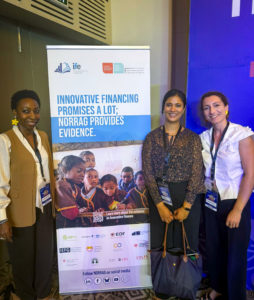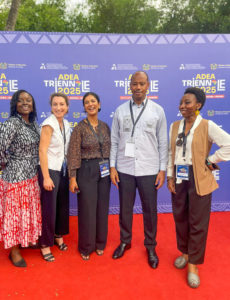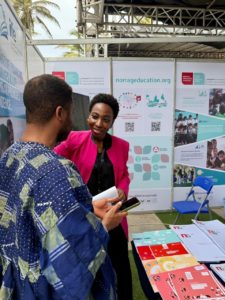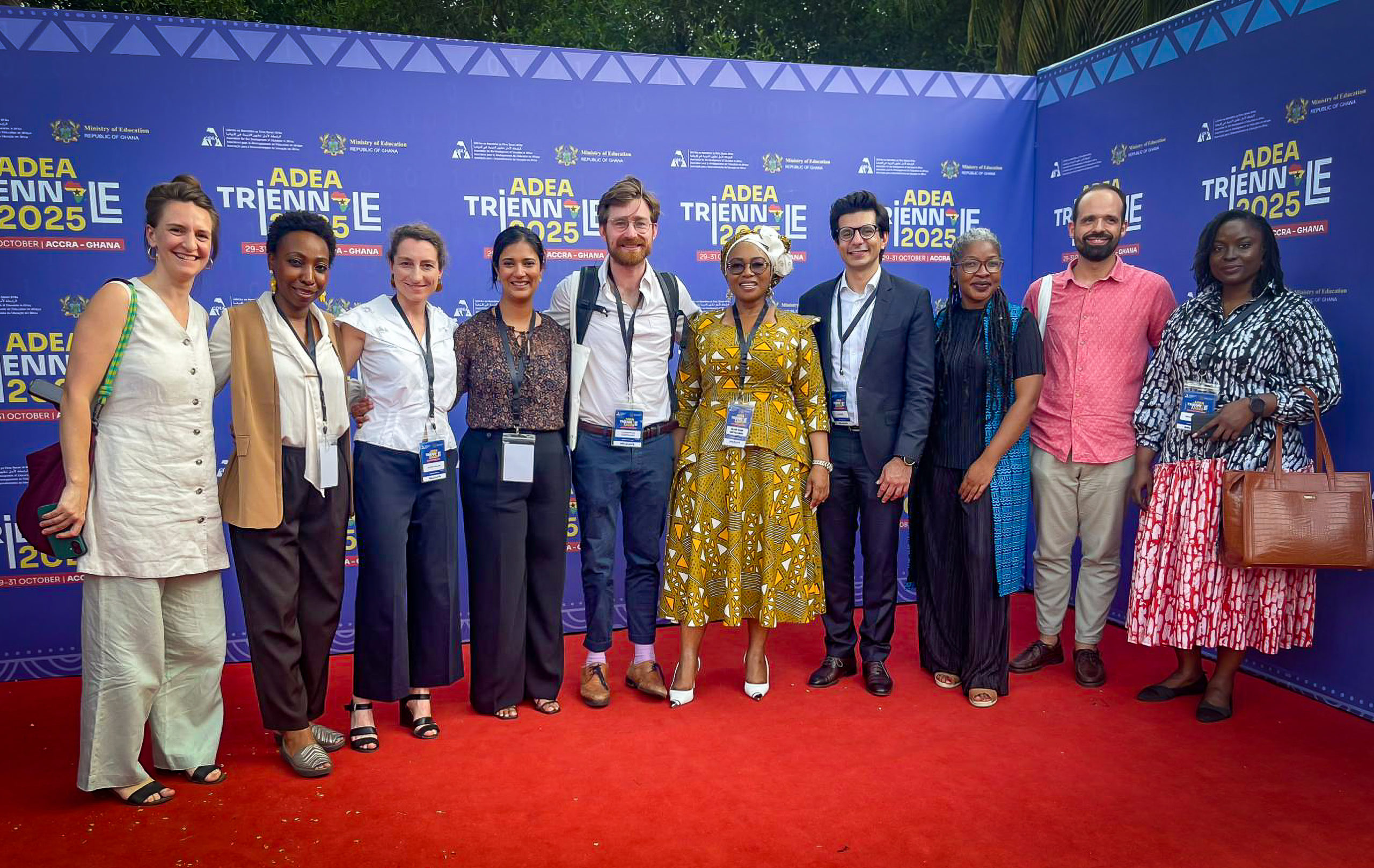Event Highlights: NORRAG at the ADEA Triennale 2025
Dialogue on Resource Mobilization from the Private Sector: Opportunities, Challenges, and Enabling Conditions
NORRAG participated in the 2025 ADEA Triennale on Education and Training, held from 29–31 October in Accra, Ghana — one of Africa’s leading high-level forums for policy dialogue, peer learning, and knowledge exchange in education. The Triennale convened over 600 in-person participants and hundreds more online, including African ministers, policymakers, researchers, civil society actors, and development partners. This year’s edition built on the legacy of past ADEA events to take stock of Africa’s progress in transforming education systems, reflect on persistent challenges, and chart a collective path forward under the African Union’s Decade of Accelerated Education (2025–2034). Guided by the overarching theme “Strengthening the Resilience of Africa’s Educational Systems: Advancing Towards Ending Learning Poverty by 2035 with a Well-Educated and Skilled Workforce for the Continent and Beyond,” the 2025 Triennale brought partners together, to explore eight interconnected sub-themes spanning foundational learning, education financing, skills development, higher education and research, digital transformation, teacher development, education data systems, and inclusion. Collectively, through plenary sessions, side events and breakout discussions, these conversations examined how evidence, innovation, and partnership can drive a more resilient and equitable education future for Africa.
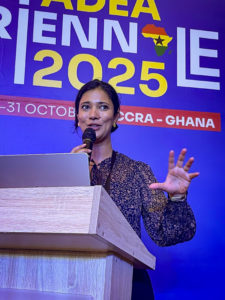
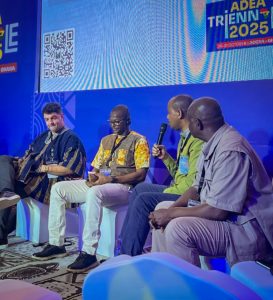
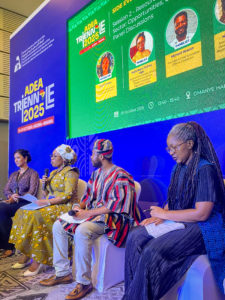
NORRAG chaired one of these side events connecting the dots between a variety of innovative financing initiatives across Africa. The session titled, Resource mobilization from the private sector: opportunities, challenges, and enabling conditions, was held on Thursday 30th October, within the larger theme of, Broadening the financing landscape: innovative home-grown and private sector-led resource mobilization for education. The session brought together speakers engaged in within the spectrum of private sector financing approaches from philanthropic pooled funds to impact investment. The speakers sparked an important dialogue on both the potential and the conditions for considering financial resource mobilization from the private sector to address the education challenges across Africa.
Arushi Terway, Education Finance Team Lead at NORRAG, underscored that while private-sector engagement holds promise in bridging the widening education funding gap, there is no one-size-fits-all approach. The potential for such funding mechanisms to generate meaningful outcomes in education depend on designing financing approaches that are context-specific and carefully tailored to address distinct education challenges. Her presentation aimed to demystify some of the technical complexities often hidden behind the buzzword of innovative financing, helping policymakers better understand both its potential and its limits.
She clarified the key distinctions in private-sector financing models:
- Non-repayable funds such as grants, donations, and philanthropic contributions, which do not need to be paid back to the financiers; and
- Repayable capital including loans, debt, and equity, which often must generate a return for capital investors. She clarified that impact investing seeks both measurable social impact and financial return, while
- Blended finance, which strategically combines government, donor or philanthropic grants and concessional capital with repayable investment to reduce risk and catalyze private investing.
She introduced the panel of experts invited to share their experience applying these models to education and invited the audience to consider: How do these models bring additional financing, ensure equity, and add value to education systems?
The dialogue featured a diverse panel of practitioners who have been piloting and scaling innovative approaches that successfully leverage private investments in education:
Christopher Burningham, Program Manager at the Education Outcomes Fund (EOF), shared how the UNICEF-hosted EOF uses outcome-based financing to catalyze private investments aligned with government-led education priorities. Using the example of Ghana, where multiple non government education service providers work under distinct contracts, he explained how this approach enables to test out various education interventions to achieve results. He emphasized that while service providers have room to innovate on the ground to best achieve education outcomes, governments must own the outcomes and that it is of paramount importance that these outcomes are pre-defined in alignment with national policy goals.
Ali Inam, Investment Director at Bridges Outcomes Partnerships, explained how his organization manages partnerships between capital investors, governments, donors and service providers for impact investing. Bridges Outcomes Partnership mobilizes capital from investors and collaborates with governments to direct funding toward delivery organizations in education. They provide performance management support to delivery organizations to ensure delivery of pre-defined education results. He highlighted the value of data and evidence generated through these models to improve efficiency and inform broader policy dialogues on education outcomes.
Donika Dimovska, Chief Knowledge Officer, Jacobs Foundation spoke about the need to move from funding programs to financing system change, and highlighted the potential of combining private, philanthropic, and public funds to create sustainable pathways for education reform. She also underscored the importance of evidence-based decision-making, ensuring every dollar delivers maximum impact. Donika highlighted examples such as SCALE, the largest pooled fund mechanism in Ghana supporting national education reforms, offering a blueprint for replication in other countries; and IFFEd, a new global multilateral initiative that will use grants and guarantees to unlock addition private capital, with a goal to make education financing more efficient and affordable.
Edwin Lehoahoa, South Africa Country Director, Chancen International introduced Income Share Agreements (ISAs) as an innovative financing model that enables low-income students to access education without upfront costs, ensuring that opportunity starts with potential, not wealth status. He explained Chancen International’s Blended Finance approach where philanthropic capital and private investment together create an education fund that focuses on access to post-secondary education and employment for youth in Africa.
A short panel discussion invited colleagues working on various projects to provide their insights into the practical implementation, alignment with national systems and need for evidence building for innovative financing approaches.
Hajia Nana Fatima High, the National Coordinator for Ghana Education Outcomes Project explained that while private sector investment can bridge the funding gap while encouraging governments to use their resources more effectively, government ownership is critical in these large-scale education projects. Safeguarding is required by the government; clear regulations and standards need to be in place to ensure quality and equity in education. Government must maintain oversight and control of the education innovations to make sure they align with national policies and plans.
Richard Brandt, CEO of CodeTrain, provided the example of using Income Share Agreement in Ghana to support marginalized youth in accessing short-term training in Artificial Intelligence and transition to employment. The pilot program provided training to youth who do not have means to pay for the training upfront but are able to return the funds after being gainfully employed while not risking future debt-burden.
Nozipho Ngwabi, Senior Project Manager: Research and Evaluation, Bertha Centre, University of Cape Town, stressed the critical role of collaborative research in informing and advancing the dialogue and implementation of innovative financing approaches. She emphasized the need for research to be conducted by experts in Africa in collaboration with researchers from the global North and with implementing partners. The research and evidence produced within the context can then be used by implementing partners and policymakers to make informed decisions on adoption and scaling on these new financing approaches
In sum, the session offered insights into how diverse financial instruments and partnerships can be strategically harnessed to drive educational equity and innovation in Africa – reminding all that effective education financing begins with understanding the problem with solid evidence, designing the right solution to solve it and closely monitoring its achieving along the way.
The session also contributed to the larger discussions at ADEA on Reimagining Financing for Education in Africa, Including Implications Due to Shifts in the Global Funding Landscape. The outcome document for the conference acknowledged the growing need for African countries to look towards the private sector to mobilize additional financing and use results-based financing and Public-Private Partnerships to improve the efficiency and effectiveness of education financing. This session left the ADEA attendees with examples of financing approaches currently being implemented with the private sector, while also asking them to consider critical questions on whether and how private sector finance can bring in additional funding, ensure equity, and add value to education systems, and be aligned with ethical financing principles.
